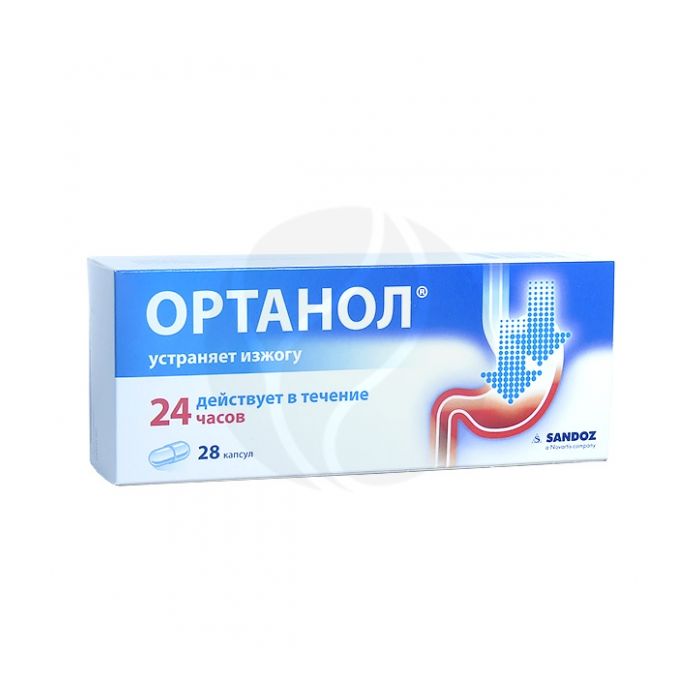Ortanol capsules 10mg, No. 28
Expiration Date: 05/2027
Russian Pharmacy name:
Ортанол капсулы 10мг, №28
Gastroesophageal reflux symptoms such as heartburn, sour belching.
Inside, before meals.
The initial dose is 20 mg (2 capsules) once a day. When symptoms begin to disappear, the dose may be reduced to 10 mg per day and increased again to 20 mg once a day if symptoms reappear. You may need to take the drug for 3-4 days to achieve symptom relief.
The maximum daily dose of the drug should not exceed 20 mg.
The lowest effective dose should always be used. The maximum course of treatment is 14 days. The interval between 14-day courses of treatment without consulting a doctor should be at least 4 months.
If symptoms do not improve or worsen within 2 weeks, you should consult your doctor.
The capsule should be swallowed whole with plenty of liquid. If the patient cannot swallow the OrtanolЃ capsule whole, you can dissolve its contents in a little water or fruit juice (do not dissolve in carbonated drinks). The resulting solution of the drug should be drunk immediately after preparation, washed down with an additional 1/2 glass of water.
Renal dysfunction: No dose adjustment required.
Liver dysfunction: consult a doctor before use.
Elderly patients: despite the fact that the metabolic rate of omeprazole in the elderly is reduced, dose adjustment when using the drug in a daily dose of 20 mg or less is not required.
| Capsules | 1 caps. |
| active substance: | |
| omeprazole | 10 mg |
| excipients: low-substituted hyprolosis - 10 mg; MCC - 7 mg; anhydrous lactose - 58.5 mg; sodium croscarmellose - 10 mg; povidone - 4 mg; polysorbate 80 - 0.5 mg; hypromellose phthalate - 24.306 mg; dibutylsebacate - 0.447 mg; talc - 0.247 mg | |
| capsule shell: hypromellose - 43.7539 mg; carrageenan - 0.1728 mg; potassium chloride - 0.288 mg; titanium dioxide - 1.3 mg; iron (III) oxide yellow - 0.0518 mg; iron (III) oxide red - 0.0335 mg; water - 2.4 mg; ink for inscriptions (iron (III) oxide black (E172) - 24-28%, shellac - 24-27%, anhydrous ethanol - 23-26%, anhydrous isopropanol - 1-3%, propylene glycol - 3-7%, butanol - 1-3%, ammonium hydroxide - 1-2%, potassium hydroxide - 0.05-0.1%, purified water - 15-18%) - 0.064 mg |
hypersensitivity to omeprazole or other components of the drug;
concomitant use with atazanavir, nelfinavir, erlotinib and posaconazole;
rare hereditary forms of lactose intolerance, lactase, sucrase / isomaltase deficiency, or glucose / galactose malabsorption;
age up to 18 years.
With caution: before using the drug, you must consult a doctor in the following cases:
- the presence of a previously diagnosed gastric ulcer, severe liver disease accompanied by liver failure, jaundice, previous surgical intervention on the gastrointestinal tract, osteoporosis;
- the presence of alarming symptoms: a significant decrease in body weight, repeated vomiting, vomiting of blood (hematemesis), impaired swallowing, discoloration of feces (tarry stools - melena);
- the appearance of new symptoms or changes in existing symptoms from the gastrointestinal tract; symptomatic treatment for indigestion or heartburn for 4 weeks or more; concomitant use with one or more of the following drugs: atazanavir, clopidogrel, digoxin, erlotinib, ketoconazole, itraconazole, warfarin, cilostazol, diazepam, phenytoin, saquinavir, tacrolimus, clarithromycin, voriconavirin ).
It is also recommended to consult a doctor before using OrtanolЃ during pregnancy and lactation.
The drug should not be used prophylactically.

